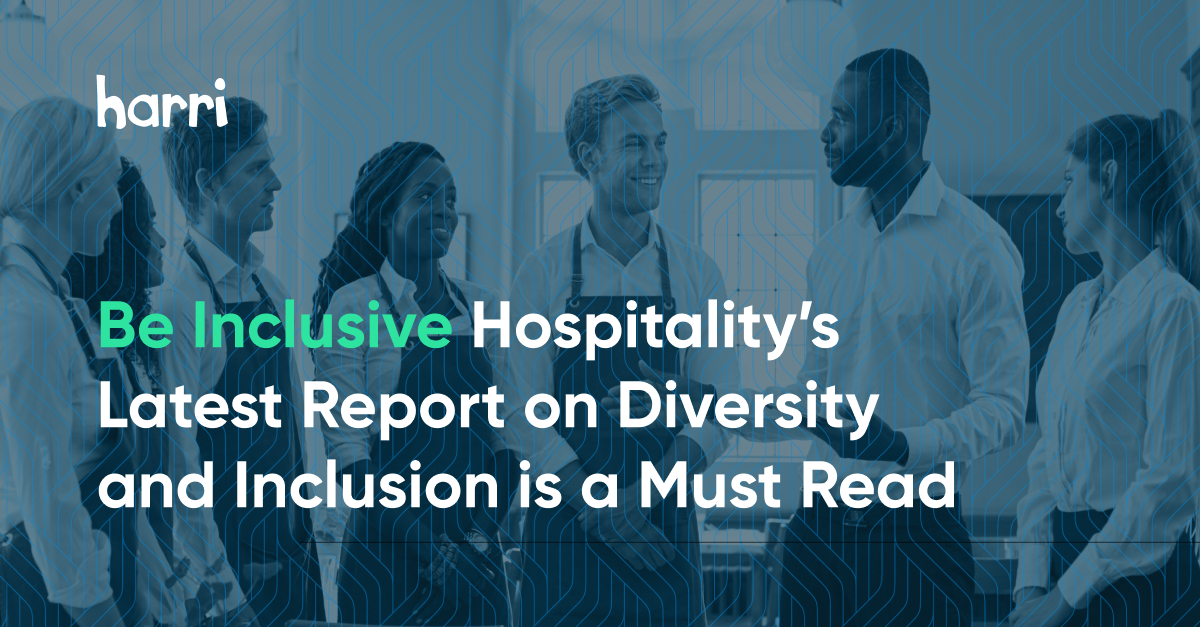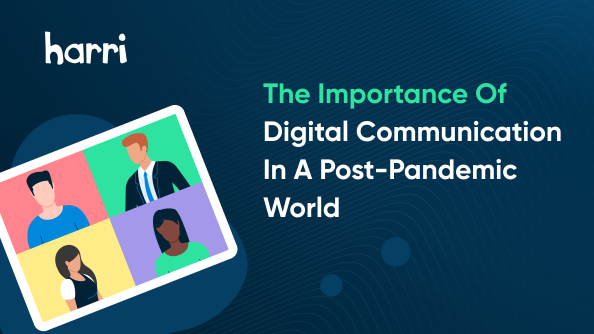Be Inclusive Hospitality’s Latest Report on Diversity and Inclusion is a Must Read

- By Harri Insider Team | May 6, 2022
It’s out! The eagerly awaited Inside Hospitality annual survey – exploring diversity and inclusion in the sector – has launched, and it makes for some eye-opening reading. Proudly sponsored by Harri, the survey was commissioned by not-for-profit organisation Be Inclusive Hospitality, and aims to understand the current situation for black, Asian and minority ethnic (BAME) workers within all areas of the industry, including contract catering, pubs, bars, hotels and restaurants.
The findings are a vital resource for operators wanting to improve the way they treat BAME workers at all levels of seniority. Here we highlight the key takeaways from this year’s survey, but if you want to read it in full, it’s available to download free from Be Inclusive Hospitality’s website.
A little bit of background
Be Inclusive Hospitality (BIH) was launched in 2019 by Lorraine Copes, with the aim of accelerating racial equality in the sector. Lorraine, a senior procurement leader, was compelled to set up BIH having observed very little ethnic diversity in leadership positions throughout her 20-year career in hospitality, despite BAME employees representing over 17% of the hospitality workforce, which is ahead of the UK workforce generally, at 12%.
A recent Resolution Foundation report concluded that there is a barrier to progression in hospitality for those from black, mixed ethnic and other Asian backgrounds, and that they faced “pay penalties” – pay gaps that account for workers’ ages, qualifications, experience, and the category of job that they do – relative to white workers. The report also found that white professionals were proportionally more likely to be in higher-paying roles than BAME professionals, despite a larger proportion of BAME professionals holding degrees.
The Inside Hospitality Survey explores in more depth the experiences of BAME employees, looking specifically at career progression, racism, diversity and inclusion, and education. Responses were gathered from 1,016 people working at all levels across the UK hospitality sector, with all backgrounds, genders, ages, jobs, and lengths of service represented.
The survey was conducted between November 2021 and February 2022.
Racism is a reality
One of the most shocking and worrying findings of the report is that 28% of Asian, 37% of black and 39% of mixed-race respondents said they had experienced or witnessed racism in their current place of work. Operations management respondents are the most likely to have experienced or witnessed racism in the workplace at 48%, closely followed by those in central group functions at 44%.
Amongst respondents who have witnessed or experienced racism, only 23% of Asian, 16% black, and 12% of mixed-race respondents have been offered wellbeing support, including mental health or otherwise. Those affected respondents are least likely to report racism to senior management, and most likely to report racism to their friends, suggesting that many hospitality bosses may be unaware of the scale of the problem.
Climbing the career ladder
The hospitality industry is largely viewed as offering good career opportunities, but clearly not all employees are getting the support and access to development they need and desire. Only 38% of Asian senior leaders and 39% of black senior leaders felt they are ‘very well’ or ‘well’ supported compared to two-thirds (65%) of white senior leaders.
Worryingly, operations teams are least likely to believe that the hospitality sector offers good career opportunities, with just 20% ‘strongly agreeing’ that their employer is supportive of their career goals and plans. Just 20% have had access to a mentor, with operations teams and management less likely to ‘strongly agree’ that career opportunities are available to all.
At every job level except senior leadership, it is black respondents who are less likely than their white or Asian counterparts to have been offered qualifications; eight in ten black respondents would like to access a development scheme or qualification, yet two in ten have accessed either.
Diversity and inclusion need further focus
Respondents are mostly positive in rating their employers to be ‘extremely fair’ or ‘fair’ on the career progression opportunities offered. However, when it comes to those who do deem their employers to be unfair on career progression opportunities, 76% of black and 63% of Asian respondents believe that unfairness is due to racial bias.
Black respondents are most likely to believe that ethnicity has hindered career progress at 43%, followed by Asian respondents (37%) and mixed-race (28%). Feeling comfortable being yourself at work can affect happiness, performance and relationships. White (36%) and mixed (35%) respondents ‘strongly agree’ they feel comfortable being themselves at work, compared to black respondents at 26%.
A yearning for learning
More than half (52%) of respondents would like to receive education or attend a workshop on anti-racism, race, or language, yet just 22% of respondents have received such training.
Those in senior leadership (32%) and central group functions (34%) are most likely to have attended courses or workshops on this topic. The format of learning tends to differ depending on job level, with those in operations teams and operations management more likely to access e-learning.
Respondents in central group functions and senior leadership are mostly likely to have accessed face-to-face workshops. There is general satisfaction with the education and workshops that have been delivered to date, but there is a clear appetite for more access.
Summing up
Overall, the respondents are very positive about the sector, with the majority believing that hospitality offers good career opportunities, most employers are fair and there are high levels of confidence that employers can create a diverse and inclusive workplace. However, it is often those from black, Asian, or ethnic minority backgrounds who have less access to development opportunities and feel less supported when compared to their white counterparts.
All respondents acknowledge that some progress has been made over the past 12 months to create an equitable, diverse and inclusive industry, but it is also widely recognised that there’s a lot more work to be done. BIH’s Lorraine Copes said: “This report does not set out to prove or disprove that race inequality exists within the sector. There are numerous studies that have been conducted to date that clearly demonstrate that societal inequality exists here within the UK.
“As a community organisation and social enterprise, we advocate for businesses building people-centred strategies for change. It is our hope that the sector can use this report as a resource and catalyst for change, in building a fairer and more inclusive industry.”
You can download the report here.





















